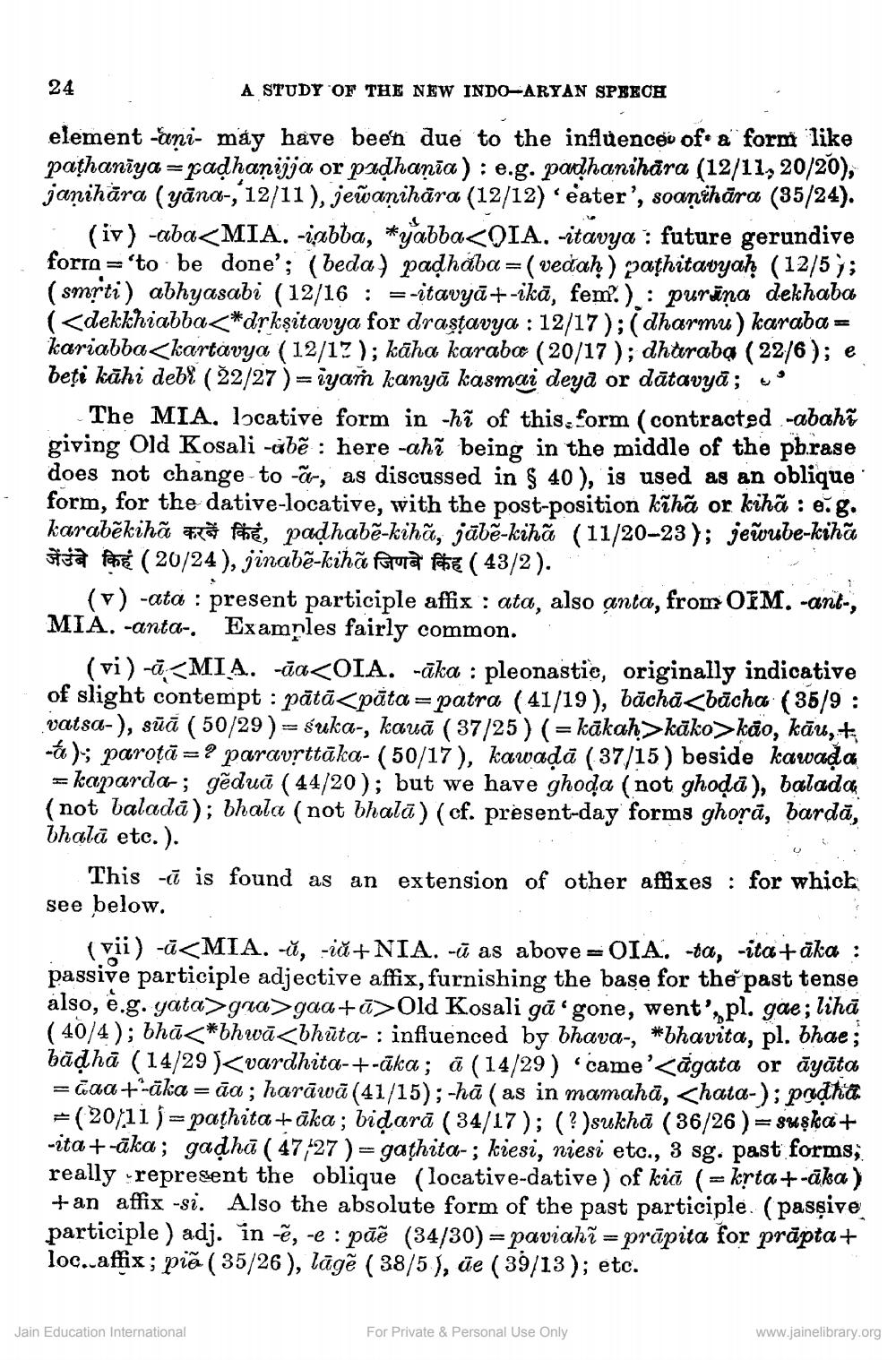________________
24
A STUDY OF THE NEW INDO-ARYAN SPEECH
element -ani- máy have been due to the influence of a forni like pathaniya = padhanijja or pædhania): e.g. padhanihara (12/11, 20/20), janihāra (yāna-, 12/11), jewanihāra (12/12) 'eater', soaņihāra (35/24).
(iv) -aba<MIA. -jabba, *yabba<QIA. -itavya : future gerundive forta='to be done'; (beda) padhaba =(vedaḥ) pațhitavyah (12/5); (smrti) abhyasabi (12/16 : =-itavyā+-ikā, fem.).: purūna dekhaba (<dekkhiabba<*drkṣitavya for drastavya : 12/17); i dharmu) karaba = kariabba<kartavya (12/12); kāha karabo (20/17); dhuraba (22/6); e beti kähi debl (22/27 ) = iyař kanyā kasmai deya or dātavyā;
The MIA, locative form in -hã of this form (contracted -abahł giving Old Kosali -úbē : here -ahž being in the middle of the phrase does not change to -ã-, as discussed in g 40), is used as an oblique form, for the dative-locative, with the post-position kāhā or kihã : eg. karabēkihã pro fare, padhabê-kihã, jābē-kihã (11/20-23); jewube-kiha fra hane ( 20/24), jinabê-kihã fue he ( 43/2).
(v) -ata : present participle affix : ata, also anta, from OFM. -ant-, MIA. -anta-. Examples fairly common.
(vi) -ă:<MIA. -ña<OIA. -ūka : pleonastio, originally indicative of slight contempt : pātā<pāta= patra ( 41/19), bächä<bācha (35/9 : vatsa-), sūā ( 50/29 ) = suka-, kauā (37/25) (=kākah>kāko>kao, kāu, + ---e); parotā= ? paravrttāka- ( 50/17), kawadā (37/15) beside kawada
= kaparda-; geduā ( 44/20); but we have ghoda (not ghoda), balada (not balada); bhala (not bhalā) (cf. present-day forms ghorā, bardā, ühalā etc.).
This -is found as an extension of other affixes : for which see below.
(vii) -<MIA. -ŭ, -id+NIA. -ū as above - OIA. -ta, -ita+äka : passive participle adjective affix, furnishing the base for the past tense also, e.g. yata>gra>gaa+ū>Old Kosali gă gone, went', pl. gae; lihā ( 40/4); bhā<*bhwā<bhūta- : influenced by bhava-, *bhavita, pl. bhae; bādhā (14/29 <vardhita-+-āka; a (14/29 ) came' <ăgata or āyāta = daa+'-āka = āa; harāwā (41/15); -hā (as in mamahā, <hata-); prodha =(20/11 s= pathita+āka; bidarā ( 34/17); (?)sukhā (36/26 ) = suşka + -ita+-āka; gadhā ( 47/27 ) = gațhita-; kiesi, niesi etc., 3 sg. past forms, really · represent the oblique (locative-dative) of kiá ( = krta +-aka) +an affix -si. Also the absolute form of the past participle. (passive participle ) adj. in -ē, -e : pāệ (34/30) = paviahi = prāpita for prăpta+ loc. affix; piã (35/26), lāgē ( 38/5), ūe ( 39/13); etc.
Jain Education International
For Private & Personal Use Only
www.jainelibrary.org




